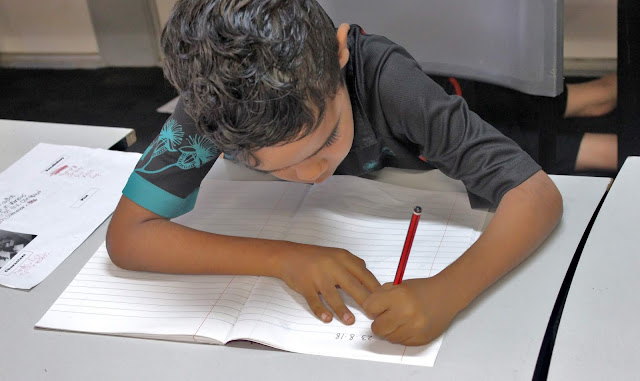Regular Practice Is Essential For Growing Student Writers
It is most important for students to understand there is a real purpose to the writing we all do. To understand that through writing they can gain a greater understanding of themselves and the world in which they live is paramount. Through writing they can communicate with a specific audience across time and space.It is through writing they can find a voice for their thoughts and ideas. It is important for them to know their writing efforts are valued.
Young writers therefore need adequate time and space to develop. Available research data shows when children are provided with opportunities to write every day they begin to compose even when they are not actually writing. In other words they begin to think about their writing beyond the confines of the classroom. This is where rehearsal for writing begins to impact the thinking of the emerging writer.
As a teacher, I have always gained immense satisfaction from hearing students, who upon entering the classroom first thing in the morning announce ‘I know what I’m going to write about today.’ They indicate clearly they understand the importance of rehearsal. They think as writers do.
Unless the young writer is afforded this daily opportunity to write they will not develop the ability to think through their writing. They will not fully understand the process of writing. This, daily writing will assist this ‘learning to think’ process to develop.
Teacher attitude is vitally important to the success of the writing program as well. If students are to be ‘risk takers’ then the teacher must be prepared to take the lead in this respect. This means that as the teacher you must be willing to write for and with your students.
I believe a teacher adds authenticity to the writing program when they write alongside students. It adds ‘credibility’ to the messages given regarding writing. By such actions a teacher demonstrates they value writing as a craft.
As a teacher of writing the primary responsibility is to show students how to write and how to develop the skills necessary to make improvements in their writing. This takes time. So patiently guiding and supporting this development by providing daily writing opportunities within a predictable classroom environment, is crucial.
It is therefore important to approach the teaching of writing from the standpoint - students will be able to write independently. To achieve this worthy goal young writers need to be supported by consistent exposure to models of good quality writing and literature. The links between reading and writing need to be constantly reinforced. By drawing these links, we supply a rich source of ideas all young writers may tap into.
Writers move towards independence when taught how to assume increasing responsibility for such aspects as topic selection, revising, editing, proofreading, publishing etc. Independent writers grow from such expectations.
It is a fact that when children have the opportunity to write on a daily basis they have little trouble choosing topics. It becomes part of the process to ponder the next ‘hot’ topic for their writing. It comes back to teacher expectations. If you have great expectations of your students in respect to their learning in general and their writing in particular, they will rise to meet that expectation.
And it follows that if children are expected to choose their own independent writing topics we can therefore expect more of their writing. After all, they have ownership of the writing.
If, on the other hand the teacher is constantly choosing the writing topics for students, or otherwise exerting control over the writing, then they will write to fulfill that particular curriculum requirement, but their writing will probably lack an essential honesty. Is it not better for your developing writers to come to know that writing is a medium through which their strongest feelings and emotions can be expressed?
I retain strong memories of my Year 5 teacher imposing a weekly writing topic on the grade. I recall with little joy writing about ‘My Life As A Pen and “Autobiography Of An Ant’. She prowled the room as we wrote on ‘her’ topic of choice. The ‘composition’ books were collected at the conclusion of the allotted time, taken away and corrected, When returned the following week, they were covered in red ink where she had vigorously corrected our writing. There was no other feedback apart from a mark out of ten. We only found out what was wrong with our writing. There was never any attempt to build on what we knew about writing. All her effort on correction was largely a waste of time.
My early experiences as a writer are what motivate me to provide explicit feedback and support, at every stage of the writing process. Young writers need to feel that their efforts to develop as writers are valued. By doing this, each child is more likely to achieve what they set out to do when the writing commenced. Be driven by the need to help the inexperienced writer narrow the gap between their writing intentions and their actions.
It is through the creation of a safe, predictable, and supportive environment, where learners are free to experiment, take risks and write regularly on matters they have identified as important, that the most educationally fulfilling things begin to occur.












Comments
Post a Comment